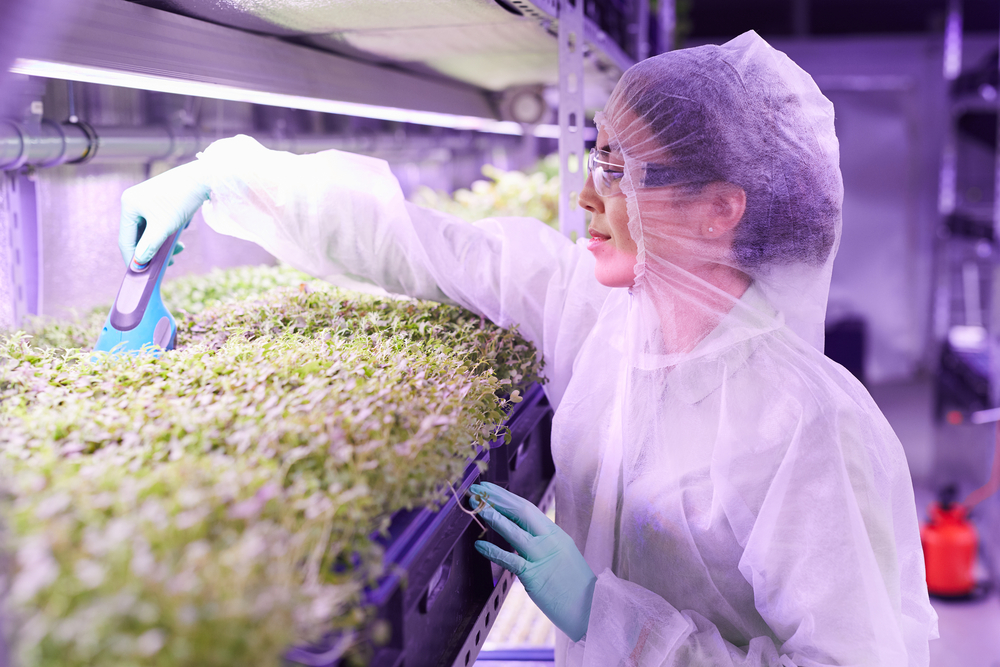IICA’s activities in this area focus on delivering technical support to review regulatory frameworks; providing training in biosafety issues, which is key for the development of biotechnology itself; and organizing communication activities aimed at clarifying and eliminating misconceptions regarding biotechnology.

SAN JOSE, 22 April 2022 (IICA). In response to a direct request from its Member States, the Inter-American Institute for Cooperation on Agriculture (IICA) is expanding its support for the national and regional development of biotechnology, an area in which it has been conducting work for more than 15 years, based on the premise that it is a powerful tool for increasing agricultural productivity in alignment with the Sustainable Development Goals (SDGs).
IICA’s activities in this area focus on delivering technical support to review regulatory frameworks; providing training in biosafety issues, which is key for the development of biotechnology itself; and organizing communication activities aimed at clarifying and eliminating misconceptions regarding biotechnology.
IICA’s support to countries in the field of biotechnology and biosafety is also aligned with the commitments, principles and key messages that the countries of the Americas agreed upon ahead of the UN Food Systems Summit 2021, with a view to improving agrifood systems.
This joint position was expressed in the form of 16 key messages on the irreplaceable role of agriculture, included in the document entitled “On the road to the United Nations Food Systems Summit: Key messages from the perspective of agriculture in the Americas”. Among other things, the messages underscore the idea that agricultural producers and other food systems workers are an essential and central link in the food system, and that, without agricultural production, there would be no raw material to transform into food.
The messages also describe agriculture as an activity that is central to poverty eradication, rural development and environmental protection. Specifically, Message 9 on production strategies and environmental issues, notes that “the new frontiers of science and technology represent a strategic opportunity to move towards developing a more productive and sustainable agriculture sector, given that they facilitate greater precision and efficiency”.
The Convention on Biological Diversity defines biotechnology as “any technological application that uses biological systems, living organisms, or derivatives thereof, to make or modify products or processes for specific use”.
Under this concept, “biotechnology is an instrument that has existed for thousands of years, because it refers to how human intelligence makes use of the resources that nature provides to solve its problems. Many of the traditional things we are familiar with and consume are biotechnology products, such as green fertilizers in agricultural production, alcohols in the industrial sector, or dairy products in the food sector”, explained Pedro Rocha, Coordinator of Biotechnology and Biosafety at IICA.
The growing use of biotechnology in agriculture is due to the fact that it provides increasingly precise tools to achieve greater, more sustainable production. “Biotechnology is called upon to boost productivity as well as reduce pressure on ecosystems, because it allows for optimizing and rationalizing the use of biological and chemical inputs (such as pesticides). In fact, from the environmental point of view, multiple and diverse benefits have already been demonstrated”, added Rocha.
Rocha clarified, however, that biotechnology is not the solution to all problems: “It is not the perfect tool, but rather an alternative that complements a series of tools that the world has generated to improve agriculture”.
The specialist added that it is crucial to guarantee the safety of these technologies and the quality and safety of their products. “The best way to contribute to technological development and its safe application is through regulatory instruments that are legally justified, science-based, transparent and efficient”, he stated.
Rocha graduated as a biologist from the National University of Colombia. He holds a Ph.D. in plant molecular biology and a postdoctoral degree in molecular plant pathology. He is an international specialist in technology and innovation, with a focus on biotechnology, biosafety, food safety and climate change.
The importance of regulatory frameworks
IICA’s support in the development of regulatory frameworks that facilitate the adoption and use of biotechnologies in agriculture directly responds to requests from countries and is of great importance, given that it empowers countries to make their own decisions regarding this topic.
“It is of no concern to IICA whether one country wishes to plant transgenic crops and another does not – they are entitled to make their own decisions regarding a technological issue. The crucial issue is ensuring that all countries possess regulatory frameworks to support their decisions, which some Latin American countries are currently lacking. Some countries are very open to the use of biotechnology and its products; others are more conservative and require more information and time to make decisions in this regard. IICA recognizes and respects this heterogeneity. A country is entitled to decide against planting transgenic crops, but it must possess a regulatory framework that defines what happens when such crops are introduced illegally. If, on the contrary, a country wishes to plant these crops, it must have rules in place that establish how this should be done”, explained Rocha.
Thus, IICA has collaborated in the drafting of regulatory frameworks throughout the hemisphere. “IICA acknowledges the fact that each country has a unique reality, and we would be wrong to propose a single, general vision that ignores the diversity of countries. In this regard, we foster joint, participatory work”, said Rocha.
Rocha underscored the fact that the Convention on Biological Diversity, to which 196 countries are contracting parties, views biotechnology as a tool to contribute to the conservation and use of biodiversity, which, in turn, contributes to achieving well-being for humanity, as expressed in the SDGs established by the international community with a view to eradicating poverty, protecting the planet and guaranteeing prosperity for all human beings.
More information:
Institutional Communication Division.
comunicacion.institucional@iica.int











